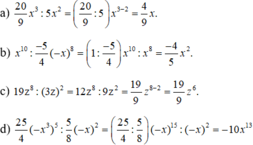Làm tính chia:
a) 20 9 x 3 : 5 x 2 ; b) x 10 : − 5 4 ( − x ) 8 ;
c) 19 z 8 : ( 3 z ) 2 ; d) 25 4 ( − x 3 ) 5 : 5 8 ( − x ) 2 .
Hãy nhập câu hỏi của bạn vào đây, nếu là tài khoản VIP, bạn sẽ được ưu tiên trả lời.



`a, 20x^3y^5 : 5x^2y^2`
`= (20:5)x^(3-2) . y^(5-2)`
`= 4xy^3`
`b, 18x^3y^5 : (3(-x^3)y^2)`
`= -(18:3)y^(5-3)`
`= -6y^2`

\(a,=5^3:5^2=5\\ b,=\left(\dfrac{3}{4}\right)^{5-3}=\left(\dfrac{3}{4}\right)^2=\dfrac{9}{16}\\ c,=1728-512=1216\\ d,=x^{10}:x^8=x^2\\ e,=\left(-x\right)^{5-3}=\left(-x\right)^2=x^2\\ f,=\left(-y\right)^{5-4}=-y\)

a, SBC=\(\sqrt{xy}\)(3\(\sqrt{x}\)-4\(\sqrt{y}\)+5\(\sqrt{xy}\))
câu b bn lmf tương tự nhé,mấy bài này liên quan đến phân tích đa thức bằng nhân tử đó bn:))

\(a,\Rightarrow x\left(x+3\right)-\left(x-3\right)\left(x+3\right)=0\\ \Rightarrow\left(x+3\right)\left(x-x+3\right)=0\\ \Rightarrow3\left(x+3\right)=0\Rightarrow x=-3\\ b,A:B=\left(2x^2-x+4x-2\right):\left(2x-1\right)\\ =\left[x\left(2x-1\right)+2\left(2x-1\right)\right]:\left(2x-1\right)\\ =x+2\)

theo định lí Bơ du ta có
f(x)=f(1)=1\(^{80}\)+\(1^{40}+1^{20}+1^{10}+1^5+1\)=6
Vậy số dư trong phép chia trên là 6

`a, (4x^3y^2 - 8x^2y + 10xy) : 2xy`
`= 2x^2y - 4x + 5`.
`b, 7x^4y^2 - 2x^2y^2 - 5x^3y^4 : 3x^2y`
`= 7/3 x^2y - 3/2y - 5/3xy^3`

1) 1/3 x 1/2 x 3/7 = 3/42 = 1/14
2) 5/4 x 1/3 +1/7 = 5/12 + 1/7 = 35/84 + 12/84 = 47/84
3) 8 x ( 8/9 - 2/3 ) = 8 x 2/9 = 16/9
4) 5/6 x 48/20 x 1/2 = 240/240 = 1
5) ( 2/5 + 3/4 ) + 8 = 23/20 + 8 = 23//20 + 160/20 = 183/20
6) 10 x ( 1/2 - 1/5 ) = 10 x 3/10 = 10/1 x 3/10 = 30/10 = 3

Thực hiện phép chia:
a) (-y^2):y^4=\(\dfrac{-1}{y^2}\)
b) (-x)^5:(-x)^3=(-x)^2
a) (-y2) : y4=\(\dfrac{-1}{y^2}\)
b) (-x)5 : (-x)3 = (-x)2

a)=1/2 . 8/15 - 3/4.47/9
=4/15 - 47/12
=-73/20
b)=2-1/3 . -21/20
=2+7/20
=47/20

\(a,=\dfrac{5x+30+x^2-30}{x\left(x+6\right)}=\dfrac{x\left(x+5\right)}{x\left(x+6\right)}=\dfrac{x+5}{x+6}\\ b,=\dfrac{3x^2+4x+1-x^2+2x-1-x^2-2x+3}{\left(x-1\right)^2\left(x+1\right)}\\ =\dfrac{x^2+4x+3}{\left(x-1\right)^2\left(x+1\right)}=\dfrac{\left(x+1\right)\left(x+3\right)}{\left(x-1\right)^2\left(x+1\right)}=\dfrac{x+3}{\left(x-1\right)^2}\)
\(c,=\dfrac{3x^2+2x+1+x^2-2x+1-2x^2-2x-2}{\left(x-1\right)\left(x^2+x+1\right)}\\ =\dfrac{2x^2-2x}{\left(x-1\right)\left(x^2+x+1\right)}=\dfrac{2x\left(x-1\right)}{\left(x-1\right)\left(x^2+x+1\right)}=\dfrac{2x}{x^2+x+1}\)